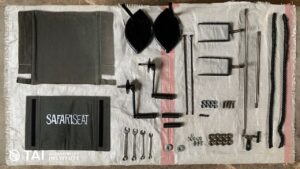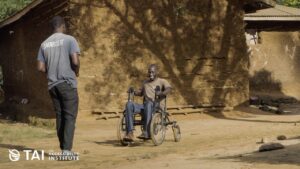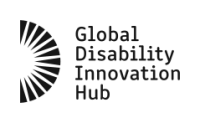This blog is part of our weekly #InnovationSpotlight-exploring the stories of ventures within our GDI Hub Accelerate portfolio. Here we meet The Accessibility Institute (TAI) , a social enterprise that completed our Kenyan-based Innovate Now Accelerator.
After being involved in an accident and requiring a wheelchair during his recovery period, Janna found himself in a situation where his independence had dramatically changed. His everyday struggle to meet basic needs motivated him to apply his design talents as an industrial designer to create a wheelchair suitable for the rugged terrain.
After entering this eco-system, Janna soon learned there was more demand than he had anticipated. The Safari seat, a revolutionary, low-cost, all-terrain wheelchair, was born—an easy-to-repair, customizable solution that can be manufactured with basic tools, using locally available materials and components.

With the success of the Safari Seat, Janna founded The Accessibility Institute (TAI) to create affordable assistive technology solutions with the ambition of bridging the gap between accessibility and inclusion.
As a member of the 4th cohort of the Innovate Now accelerator program, Ken – the co-founder of TAI – got a chance to co-create alongside wheelchair users, the disability sector, and wider community stakeholders. One of their products that went through this testing period was the Safari Cart. User testing identified the request to have a carrier on the rear of the wheelchair so it could be used to sell products to make a living. This wheelchair now provides that choice.

“Most of the changes that we’re making now to our Safari seats, is due to that collaboration with GDI Hub.”
Ken Mwarandu
New developments are evolving all the time. Safari Kids and Safari Work (a work top that will attach to the front of the wheelchair) are due next year. These developments will support students, reducing the need for transfers from wheelchair to desk. The design also includes a compartment for stationery and resources.
Founders Janna and Ken received entrepreneurship training through the Innovate Now accelerator programme, learning how to scale products into the marketplace. Innovate Now also provided a forum to meet and network with disability professionals and researchers, and they now have access to a platform for continued networking which is directed by Bernard Chiira, the Director of Innovate Now and GDI Hub’s Kenya Representative.
“One way we are doing this is by turning the safari seat wheelchair into a means of generating cash that would allow users to support themselves.”
Ken Mwarandu
Even though the road has been rewarding, there have been obstacles along the way. The team recalls that the research and development process took a long time, and is a continuous process. They also had to overcome sales obstacles, getting organizations or the government to start making purchases.
Regardless, Ken believes that aspiring entrepreneurs should not be scared to innovate. He proposes taking baby steps. Rather than producing a product, entrepreneurs could consider marketing or providing a solution. They should also consult with the community or the group of people they want to serve.
“Engage with the community, or the group of people you want to serve, before you make a final version of your solution.”
Ken Mwarandu
Moving forward, TAI’s goal is to have impact programs that support people living with mobility impairments to access education, employment, financial inclusion, and social inclusion by introducing the Livelihood and microcredit programs that offer people living with mobility impairments a comprehensive path out of poverty. To date, their work has had an impact on 1017 family members across 6 countries.

About Innovate Now
Innovate Now was launched in 2019 as part of the £40 million, UK Aid funded, AT2030 program, led by Global Disability Innovation Hub. “Implemented through a consortium of partners including Amref Health Africa (lead implementing partner 2019-2021) and Kilimanjaro Blind Trust (Live Labs implementing partner and new lead implementing partner).” (“Innovate Now, Africa’s first Assistive Technology accelerator reignited .”) Today’s Innovation Now is a partnership between the Global Disability Innovation Hub (GDI Hub), ICT Norway and Norad, bringing a new wave of momentum in the African innovation space.









